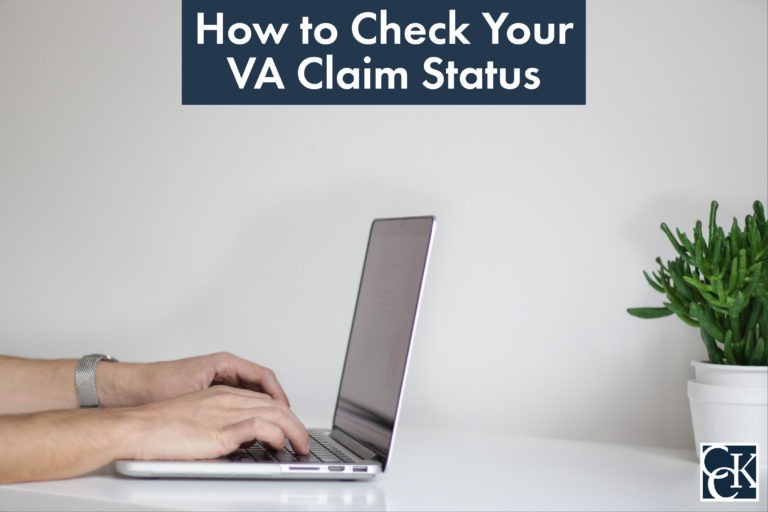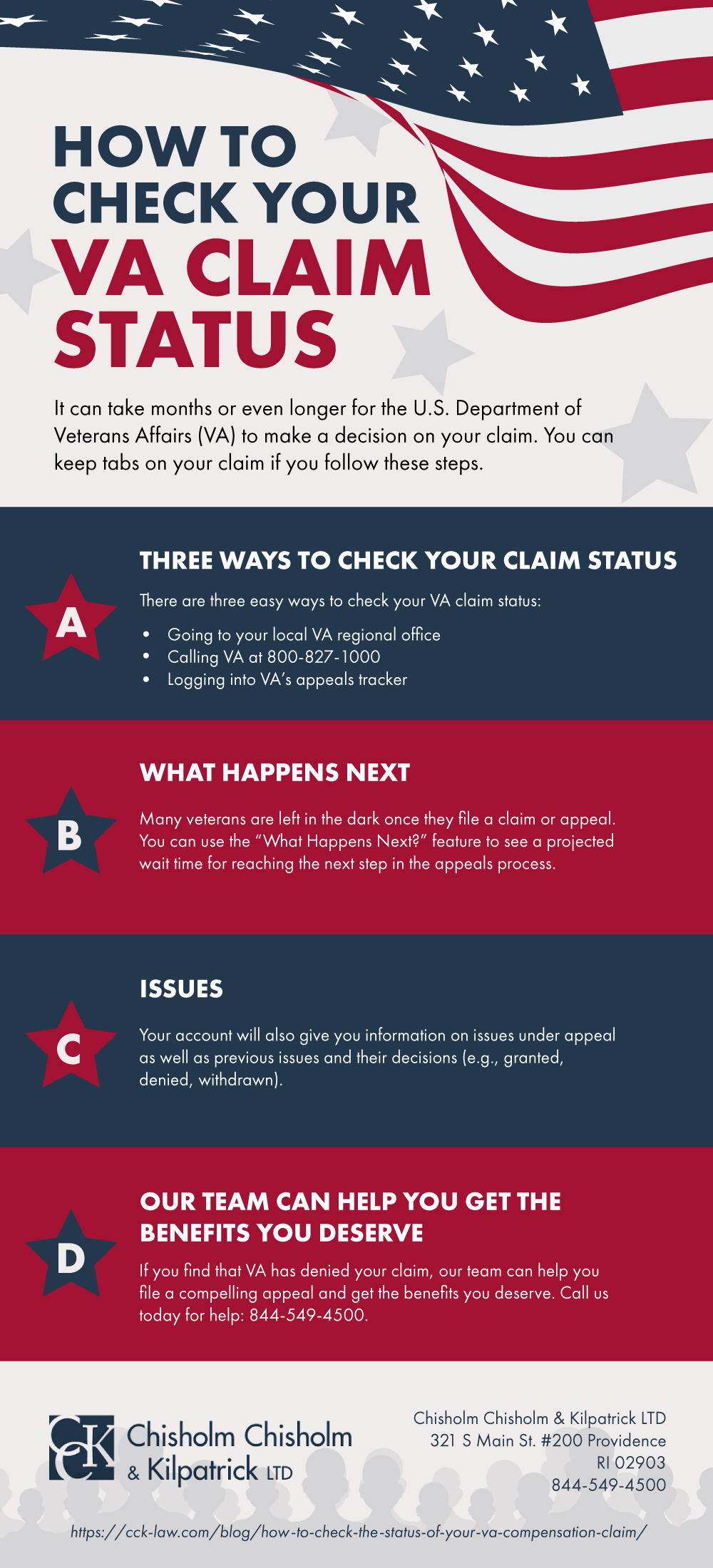How to Check the Status of your VA Compensation Claim

CCK Law: Our Vital Role in Veterans Law
By checking the status of your VA claim, you know what stage of the appeals process your claim is in and can help you avoid missing deadlines and better understand how the VA claims and appeals process works. The length of the VA claims and appeals process can vary tremendously based on many factors, including the number of issues for which a veteran is filing a claim, the complexity of the case, and whether the veteran is in the old appeals system (i.e., the legacy appeals system) or the current appeals system (created by the Appeals Modernization Act, or AMA).
Generally, there are eight steps that disability claims follow:
- Claim Received. Your claim is moved to this stage once it has been received by VA.
- Under Review. A Veterans Service Representative is reviewing your claim to determine if there is a need for additional evidence. This includes the results of your Compensation and Pension Exam, which VA will schedule.
- Gathering of Evidence. If the Veterans Service Representative deems that your claim requires additional evidence, he or she will request it from the appropriate sources.
- Review of Evidence. All evidence is received and is under review.
- Preparation for Decision. At this stage, the Veterans Service Representative has recommended a decision and is preparing documents detailing that decision.
- Pending Decision Approval. The Veterans Service Representative’s decision is reviewed, and a decision is made.
- Preparation for Notification. Your decision is being prepared for mailing.
- Complete. The award or decision is sent to you via U.S. mail, along with the details surrounding this decision.
VA allows veterans to check the status of their claims throughout the claim stream in three ways:
- By visiting a local VA regional office;
- By calling VA’s national toll-free phone number at 800-827-1000; hours of operation are Monday through Friday from 8 A.M. to 9 P.M. Eastern Time. It is recommended to call early in the morning to avoid wait times of 30+ minutes.
- Or by logging into VA.gov and using VA’s appeals tracker.

Online VA Appeals Status Tool: eBenefits
E-Benefits is a secure web portal created by the Department of Veterans Affairs and the Department of Defense in an effort to provide veterans, service members, and their families self-service capabilities in managing VA and military benefits. This portal previously allowed veterans, service members, and their families an array of self-service functions such as checking the status of a VA claim.
*VA has moved most applications and tools from eBenefits to VA.gov. For more information on this, visit eBenefits.va.gov.
Checking VA Claim Status: VA.gov
To check the status of a VA claim using VA.gov, veterans will need to sign in with their existing Login.gov, ID.me, DS Logon, or My HealtheVet account. Veterans who do not yet have a login can create a Login.gov or ID.me account.
After logging in, veterans can find a list of their claims, decision reviews, and appeals. Veterans can check their statuses in the list, or select a claim, decision review, or appeal to see the full details. They can also see the following:
- Evidence the veteran has filed online to support their initial claim
- Any additional evidence VA has requested
- Their claim, decision review, or appeal type
- The claimed issues/conditions
Veterans can also use the tool to upload evidence for an initial claim (but not for a decision review or appeal) and download decision letters for certain types of claims. Certain types of documents will not appear online, such as documents sent by mail or fax, documents submitted in person, or restricted documents to protect the veteran’s or someone else’s privacy.
Importantly, under the Appeals Modernization Act (AMA), veterans will have one year to appeal unfavorable VA decisions. However, there are exceptions to this timeframe. For example, if veterans receive an unfavorable Board decision and choose to appeal to the Court of Appeals for Veterans Claims (CAVC), they must do so within 60 days of judgment.
If veterans do not appeal within the timeframes outlined above, their decisions will become final. When a decision becomes final, veterans will lose their effective dates since the claim will no longer be continuous.
VA Claim Wait Times
Similar to the Legacy Appeals system, VA does not operate under any mandated deadlines. However, VA proposed several timeframe goals regarding the processing of decisions under AMA. Namely, in both the supplemental claim and higher-level review lanes, VA set forth a 125-day goal for issuing decisions.
With regard to the direct docket within the Board lane, VA set forth a 365-day goal for issuing decisions. While both the hearing and evidence dockets are subject to longer wait times, VA intends to provide regular wait time predictions so that veterans can remain informed and up to date on the status of their appeals. As of Fiscal Year 2019, VA has been taking 96 days on average to make decisions on veterans’ initial claims.

Other Ways to Check Your VA Claim or Appeal Status
If veterans are unable to check the status of their claims and appeals on their own, they should consider requesting help from their representative, if applicable. There are several ways in which representatives can check the status of veterans’ claims and appeals, including the following:
Issues on Claim/Appeal
At the top of the page, there is a tab entitled “Issues” where you are able to see what issues are currently on appeal and previous issues that have been closed whether they were granted, denied, or withdrawn. If you need assistance during any point in the appeal process, do not hesitate to contact a VA-accredited claims agent, Veteran Service Organization, or VA-accredited attorney.
Calling the VA’s Toll-Free Number
Again, veterans may also check the status of their appeals by calling the VA’s national toll-free number: 1-800-827-1000. When calling this number, veterans should remain on the line and follow the recorded instructions. The hours of operation are Monday through Friday from 8am to 9pm (ET). It is recommended that veterans call earlier in the morning to avoid long wait times.
Visit a Local VA Regional Office
Veterans may check the status of their claims and appeals by visiting a local VA Regional Office in person. Veterans should be sure to bring proper identification, including a valid photo ID, social security number, and VA claim number. Once at the Regional Office, a front desk representative will be able to direct veterans appropriately.
Veterans Benefits Management System (VBMS)
The Veterans Benefits Management System (VBMS) is essentially an online database comprised of veterans’ electronic claims files. It is a depository of all the information related to a specific veteran and their compensation claim. Both VA adjudicators and veterans’ advocates have access to VBMS. When accessing VBMS, adjudicators and advocates must log in and search for a specific veteran within the system. They will then get a list of all the documents in the veteran’s claim file. Overall, VBMS access is helpful because it allows veterans’ representatives to remain up to date on veterans’ claims and appeals. It is the only way advocates can see what is going on in real-time. As such, it allows veterans’ representatives and advocates to provide veterans with accurate case status updates.
In addition to VBMS, VA also uses online systems known as Veterans Appeals Control and Locator System (VACOLS), Caseflow, and E-Folder Express. Again, it is important to note that only VA adjudicators at the Regional Office and Board level personnel have access to these databases (veterans’ advocates do not).
VACOLS
VACOLS is the online system VA has historically used to track veterans’ appeals at the Regional Office and the Board of Veterans’ Appeals. It provides information about exactly where an appeal is, both in terms of physical location and procedural status.
Caseflow
Caseflow is the new electronic filing record system that is designed to replace the functionality of VACOLS. The new system, introduced with the Appeals Modernization Act, is intended to keep track of the status of veterans’ cases going back and forth between the Regional Office, Board of Veterans’ Appeals, and Court of Appeals for Veterans Claims (CAVC). However, it is important to note that the CAVC does not currently use any of these systems as a veteran’s file is static once it gets to the Court. This means that veterans cannot supplement the record through the submission of additional evidence. Instead, the Court can only review the veteran’s record as it existed the date the Board made its decision. The CAVC goes through the electronic filing process only to review some of the documents listed in the parties’ briefs.
E-Folder Express
E-Folder Express is a component of Caseflow that allows for one-click downloads from VBMS, or one-click downloads of electronic claims files.
About the Author
Share this Post
